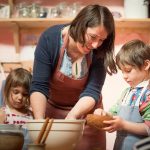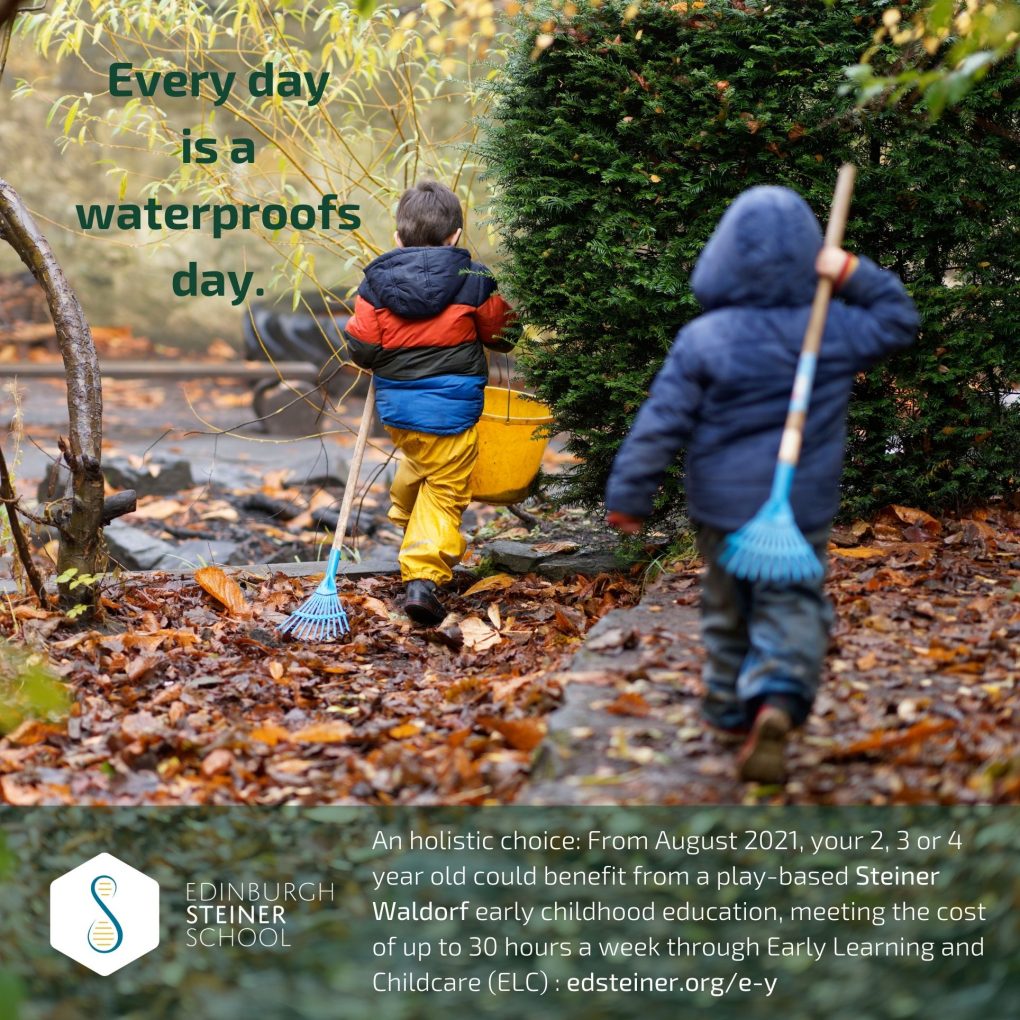Big Changes For Little Pupils
September 25 2020

P1 pupils were among the first children to enter the classroom this academic year, following almost five months of a Covid-break. Children whose birthday falls between September – February enter the school environment at just 4-years-old. Following lockdown, more parents are seeking out a ‘slower start’ for their child, based on well-established principles of child development.
Maximizing outside space and a focus on play has been essential to the safe returning of the ‘school day’ on campus; both in terms of reducing the spread of the virus and the wellbeing of the child. Yet it is far from ‘return to normal’ as many parents are no longer able enter the school gates; and Open Days are out of bounds.
In spite of these challenging times, Edinburgh Steiner School’s intake of applications increased during the pandemic. Based in Merchiston’s Conservation Area our Early Years childcare setting has enclosed mature gardens with living willow house, climbing trees, bonfire area, woodwork benches, outside kitchen, areas for mud and water play, organic vegetable plots, composting, swings, sandpits and wildlife, where the children can work alongside the adults in caring for the garden, growing produce and recycling, which are part of the ethos.
Uniquely, it has long run a curriculum that has embraced a delayed start to formal learning. Children here start their school career aged 6 or 7. Before then, they learn in an environment that is simple and unhurried without the notions of ‘achievement’, ‘success’, or ‘failure’. Specialist teachers follow the internationally-recognized principles of the Steiner Waldorf curriculum, where education in the first six years is integrated.
 Integrated learning
Integrated learning
Mathematical concepts, for example, are learnt throughout the daily activities. Baking bread or preparing soup from fresh vegetables, and setting the table, involves weighing, measuring, counting, number work and quantity. In watercolour painting, repeated patterns, shape and use of space are discovered. Drawing explores pattern, mark and number making, as well as sorting crayons. Sewing offers the child the experience of counting, measuring, ordering and sequencing. Woodwork lets them problem-solve, measure, count and use numbers in a variety of ways. Role play employs their curiosity and observation, where numbers are introduced in a variety of ways: Tidying enhances their skills in sorting, counting and sequencing. (Read more: Holistic approach to maths adds up)
We have admitted more children through this summer than last year, particularly children in the middle year of kindergarten. These are children who are of an age to go to state primary school, but whose parents are looking for a slower start for their child.
Kindergarten Coordinator, Susie Musgrove.
 A holistic environment
A holistic environment
Steiner philosophy behind ‘rhythm’ is not a routine or schedule but to integrate the child’s need for in breaths and out breaths – time for quiet absorption (painting) followed by time for moving and expansion such a free play. So, a time to create and a time to release. This is enhanced by the rhythm of the week where a certain activity marks the difference in days of the week, which are unchanged. Children know what will be coming next which builds a sense of security in the adults and environment around themKindergarten teacher, Dawn Morrison
 Increase to Early Years provision at ESS
Increase to Early Years provision at ESS
Edinburgh Steiner School’s Early Years provision grew significantly over the summer holidays. Seedlings Playgroup, for children aged 2+, is now provided five days a week during term time until 3.15pm. Attended without parents/carers, it welcomes up to ten toddlers, and enables them to develop independence, meet new friends, learn social skills and have fun.
Seedlings is often the first toddle away from home, and there is the option of a 1pm finish time each day; with children coming for a minimum of two mornings a week. This group can provide a stepping-stone before children make the progression into Kindergarten at the age of 3½ years.
Kindergarten is attended five mornings a week, with the option of a 6.5 hours session provided one-five days a week as required, bookable in advance. Both are led by qualified teachers, who are Steiner-trained specialists in the important first 0 – 7 years old.
Children born in January and February 2016, who will be just four-and-a-half-years-old in August 2021, are able to apply to Defer their P1 place; and if the Council receives the completed application to Defer by the deadline date of 28th March 2021, their nursery place is automatically supported for the full academic year August 2021-July 2022, allowing the child more time in an Early Years setting before they begin formal learning aged 5.
Those children born in September – December 2015, who would also not yet be 5 on the first day of the Autumn term, share the right to begin schooling aged 5. Yet, financial support in this decision is at the discretion of parents’ local Council, following a rigorous application process.
A recent Freedom of Information request by a Give Them Time campaigner revealed that Edinburgh Council received 97 requests to defer with funding in 2019/20. 39% were denied (thirty-eight 4-year-old children). Of the 25 appeals that followed these decisions, only half (thirteen) were upheld. This means that more than 1 in 4 children were forced to primary education at age four (when a parent has asked for help and support to provide the child with another year of learning, care and support in an Early Years setting), unless their parent found the means to meet the full costs of a further year. Many more parents were unaware of their right to defer.
Give Them Time campaigners are effectively working to end the ‘birthday discrimination’ felt by families living in 30 of the 32 local authorities (including Edinburgh City Council), whose 4-year-old is born in the last quarter of the year. Recognizing it is a parent’s legal right to decide when their child should be educated and where this occurs, their efforts have led Maree Todd, the Minister for Children and Young People, this month to confirm legislation will be introduced before the end of the parliamentary term to ensure funding for all children whose parents wish them to attend an additional year in nursery.
Sue Palmer, author of Toxic Childhood, is the founder of Upstart Scotland, a campaign challenging Scotland’s school-starting age. Advocating a Kindergarten setting in Scotland for all children under 7-years-old, Upstart’s website links to a volume of evidence in support of their vision from neuroscientists to child development specialists. In June 2015, these strands of evidence were brought together in a book – Upstart: the case for raising the school starting age and providing what the under-sevens really need (written by Palmer, published by Floris Books). It outlines that not only is there no advantage to early schooling, there is in fact significant social and emotional disadvantages.
 Wellbeing
Wellbeing
The first UNICEF survey of child well-being, in which the UK came bottom, was in 2007. In the second, the UK had made a little progress, ranking 16th in 2013, but we were still severely out-ranked by other European countries, all of which have a later school starting age. Disturbingly, as of the beginning of this month, the UK fell to 27th overall of 41 countries.
Sadly, the UK – which includes Scotland – is obsessed with ‘measurement and accountability’. Central government ‘s craving for statistical evidence of progress infects local government with the same craving. Local authorities then pass on the paranoia to schools, where senior managers pass it on to teachers, and teachers pass it on to the children and young people in their classes. And, perhaps most sadly of all, it is also communicated to the parents of tiny children, who come to believe that the sooner their offspring climb on to the data-based treadmill, the more ‘successful’ they will be.
Once national standardised assessment is established, it becomes the driving force behind education – and, in the end, schools become little more than ‘exam factories‘.
Ahead of the Scottish Government’s flagship childcare policy that will see Early Years childcare provision almost double from 600 Hours to 1,140 Hours, Upstart is advocating for a statutory play-based, relationship-centred pedagogy for the first seven years, based on ‘the Nordic model’, and also fostered in over 2,000 Steiner Waldorf Kindergartens around the world, including Edinburgh Steiner School’s Playgroup and Kindergarten.
Although it seems counter-intuitive – a full day in a good kindergarten is these days probably preferable for many children than more hours spent at home.
When Steiner was writing, children would be off with their friends for most of their leisure hours – which was good for mums because it gave them time and space to get on with cooking and other domestic tasks. Children aren’t supposed to be cooped up indoors with their parents for hours every day. I think the amazing daycare facilities are a main reasons Finnish children score so high in the well-being charts.
Sue Palmer, Speaking to Edinburgh Steiner School
This will come as a relief to many parents who have been conflicted by the barrage of parenting expert advice and the rise in fear of letting children out of our sight – the free-range child on the verge of extinction. Whilst it is encouraging to see the adoption of a play-based pedagogical approach in an increasingly number of P1 classrooms in Scotland, it is not yet compulsory; creating a postcode lottery not only for parents’ ability to defer their child’s school start, but also access to play-based learning. Scotland believes in ‘getting it right for every child’ but our education system hasn’t kept up to speed with neuroscience and evolutionary biology, having one of the youngest school starting ages in the world.
“More than ever nowadays, where things are changing, where the way we interact with the world has become so much more indirect because of new technologies, where we need to cope with a completely different sensory environment, this type of education is more important than ever.”
Nobel Laureate (Neuroscience) & Waldorf graduate, Dr Thomas Sudhöf, speaking at the Waldorf 100 celebrations in Silicon Valley.
The starting age in Europe’s most successful countries is, by comparison, six or seven; Finland’s being the latter. No child is expected to read or write in these first seven years; though most are well on the way to being both literate with numeracy skills too. In the words of a Finnish government minister in 2004: ‘It was not always like this, but thirty years ago we thought: “How do we get a good society?” And we said: “We must look after our little children.”‘
 Preaching to the converted
Preaching to the converted
When Upstart visited Edinburgh Steiner School in 2018, the campaigner manning the stall at our Friday Market noted: ‘This is preaching to the converted here”.
It has long been an ambition of Edinburgh Steiner School that access to a Steiner education should not depend solely on the ability to pay fees. For almost forty years, our School has been a registered Partner Provider of childcare. All children aged 3 and 4 can take up their 600 Hours of funded early learning and childcare in our holistic setting, which has been continued this academic year following the postponement of the increase to 1,140 Hours, it’s full roll-out across Scotland impacted by Covid-19.
In conjunction, both our Seedlings and Kindergarten are registered providers with the Tax-Free Childcare scheme, meaning parents of eligible children under P1-age can further reduce the cost of childcare by 20%, paying fees through a Tax-Free Childcare account. Thus, fees for a 3- to 4-year-old pupil attending five days a week until 3.15pm can be more than halved.
The fee structure for Seedlings supports parents in increasing children’s early years education beyond the 600 Hours (roughly 16 hours a week during term time). Morning sessions until 12.50pm offer 4 hours a day; with no extra charge for the 5th morning. The cost of Kindergarten’s 5-mornings reflect the same support.
For that third important year of Kindergarten, the School’s Board of Trustees distribute 5% of the previous financial year’s net fee income in the form of bursaries for the forthcoming session. This means-tested help continues to be available to help fund a proportion of fees for qualifying families for Kindergarten children no longer in receipt of funded early learning and childcare, through to the final year of Class 12.
Read our Meeting Costs of Childcare Guide.
Learn more about Edinburgh Steiner’s integrated approach to education in the Early Years; read parent testimonials, watch our short film and take a virtual journey around our nature playground and child-friendly architecture by visiting our Virtual Tour; and book an individual family walk around our grounds with our Early Years Coordinator.
 An alternative educational passport to summative examinations
An alternative educational passport to summative examinations
In contrast to Edinburgh’s other independent schools, our admissions procedure means we welcome pupils of all academic abilities and value them for what they bring to the school community. There is no academic entrance exam.
Edinburgh Steiner School collaborated with Waldorf Steiner schools in Finland, Norway and Denmark as well as sister schools in the UK as part of the Acknowledging Creative Thinking Skills (ACTS) project to find a solution to the crisis in education caused by examinations. Edinburgh Steiner School is now a centre for the delivery of Integrated Education; a suite of portfolio-based qualifications that recognise formal, non-formal and informal learning.
In an interview Professor Thoams Sudhof, Patron of ACTS, gave during the 3-year collaborative international project, Dr Sudhof is quoted saying:
I spent my entire school education in the Waldorf system. When I emerged from it, I’m sure I wasn’t as well trained in many of the STEM systems. But I don’t think that matters. In particular, I feel that today’s education, at every level — certainly in school, but even in college — is way too much focused on the so called “STEM subjects”: science, technology, engineering and math. The fear that we may become illiterate in those subjects, is probably well founded, but you can’t just cram it into people. It’s not productive, and certainly not in young children. So I think that fostering creative thinking and individual initiative early on is tremendously positive. (Empowered Doctor).
Perhaps of interest:
What would a Scottish kindergarten for under 7s look like?
Edinburgh Steiner School to offer Early Years pupils 1,140 hours ELC
Learn: For life, from life and throughout life

